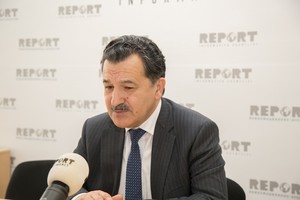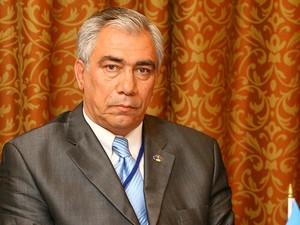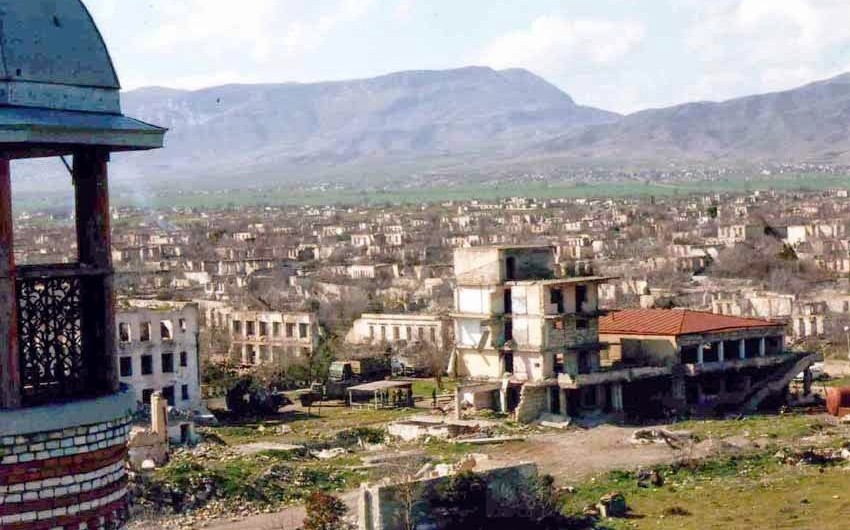"To complete substantive negotiation process at the negotiating table it is necessary to demonstrate a serious political approach and make a decision. You're sitting there and deceiving yourself, you want to deceive the Armenian people. What have the Armenian people gained during the 30-year conflict with Azerbaijan?" Azerbaijani Foreign Minister said answering questions from Armenian journalists in Brussels on May 14.
According to him, during these years, Azerbaijan has developed its economy and the railway, pipelines and gas pipelines (Baku-Tbilisi-Kars, Baku-Tbilisi-Ceyhan and Baku-Tbilisi-Erzurum projects have been launched, the Southern Gas Corridor project is being implemented) bypassing Armenia have been built: "All the strategic projects we have talked about today bypassed Armenia. What have the Armenian citizens gained from the conflict with Azerbaijan?"

The minister said that the poverty rate is high in Armenia (over 40%): “When going from Tbilisi to Yerevan at night, everywhere looks dark and all the villages are deserted. Armenians leave the country massively, who is left there? Those, who have the opportunity, are leaving the country. "
Deputy chairman of the Parliamentary Committee on Security and Defense Aydin Mirzazade told Report that despite the fact that, conflict is damaging both Azerbaijan and Armenia, it is Armenia that suffered most: "Although Armenia occupies our lands, it cannot effectively use those territories. Because it could neither get an international legal status on those lands, nor accommodate people there. Armenia had to accommodate up to half of Azerbaijanis displaced from Nagorno-Karabakh in order to start a farm. Today, the number of people in Armenia is decreasing. When this is the case, how can Armenia find people to accommodate in Nagorno-Karabakh? Thirty years ago, the population of Armenia was 4 million, and today it is only 2 million."
According to him, the closure of Turkish borders with Armenia has officially restricted Yerevan's access to the sea, which has a negative impact on the economy of the country: "Both the former leaders of Armenia and the current prime minister admit this. In short, the Armenian nation, which has gained independence after a thousand years, is unable to preserve its independence in a normal way today. Naturally, we can see that this conflict has cost Armenia a few trillion dollars with mathematical calculations. At the same time, if Armenia had normal economic relations with Azerbaijan and Turkey, a lot of investment would be made in its economy, Armenia could participate in regional projects and oil and gas pipelines would pass through its territory.Today, Azerbaijan is in the spotlight.
"There are many countries that want to use Azerbaijan's potential. Today, investments are being made in Azerbaijan and international events are held in Baku".
Deputy chairman of the Parliamentary Committee on Security and Defense Aydin Mirzazade
"If Armenia had normal economic relations with Azerbaijan and Turkey, a lot of investment would be made in its economy, Armenia could participate in regional projects and oil and gas pipelines would pass through its territory.Today, Azerbaijan is in the spotlight."
Aydın MirzəzadəMilli Məclisin deputatı Aydın Mirzəzadə
"There are many countries that want to use Azerbaijan's potential."
The MP noted that today Armenia faces the threat of losing its statehood: "Armenia's image as an occupier of Azerbaijani lands destroys its political reputation. Most certainly, each nation and society chooses its fate by its own decisions. Therefore, facing the threat to statehood is the destiny of the Armenian people. Because the absence of normal relations with the neighboring countries leads to the weakening of the economy and subsequent migration of the Armenian people. Therefore, Armenia will sink in its own swampland. Each state is judged on its own weight in the international arena. Armenia today has no parameters that could grab the attention of foreign countries. Because Armenia is not known for its economic power, political reputation or cultural heritage. "
National Secretary of the Transport Cooperation Program (TRACECA) on Azerbaijan Akif Mustafayev told Report that if Armenia withdraws its troops from the occupied lands, it may be involved in a number of transport projects to which Azerbaijan is a party: "At present, Armenia cannot join any of the transport projects Azerbaijan has joined. If Armenia gives back our occupied territories, Azerbaijan will enable Armenia to access to all projects stage-by-stage. Of course, this factor also benefits Armenia. Azerbaijan can even create conditions for Armenia to join Baku-Tbilisi-Kars. In addition, Armenia has long been part of the East-West project, but national leader set a condition in treaty, forbidding official Yerevan from using that transit as long as the occupation continues.
"If Armenia gives back our occupied territories, Azerbaijan will enable Armenia to access to all projects stage-by-stage. Of course, this factor also benefits Armenia. Azerbaijan can even create conditions for Armenia to join Baku-Tbilisi-Kars.
According to him, Armenia's participation in regional projects can be of great benefit to it: "The Armenian population is currently very poor. They survive only with aid and donations. Without them the country would suffer from starvation. But if they participate in the projects, they can benefit from transit and advantage of Azerbaijan. Just like Georgia is taking advantage today, Armenia can also win in the same way."
Akif MustafayevTRACECA Hökumətlərarası Komissiyasının Azərbaycan üzrə milli katibi
Research Associate at the Oxford Institute for Energy Studies (OIES), Advisor at World Energy Council's Global Gas Center and Founder and Managing Director of Eurasia Analytics Gulmira Rzayeva told Report that, over the past 25 years, Armenia has lost much due to its non-participation in regional energy projects implemented by Azerbaijan: "Big difference appears when comparing between the economies of Azerbaijan and Armenia. This is the result of international projects implemented by Azerbaijan. Over the past 25 years, Azerbaijan has earned $ 100 billion in revenues. This is particularly related to energy projects. Armenia was left out of all these projects and the price for that country was too high. It's not difficult to see it today."
"If the conflict is settled, if Armenia withdraws from Azerbaijani lands and is involved in these projects, of course, Armenia will also benefit from it. In particular, it will be a financial benefit. Baku-Tbilisi-Ceyhan oil pipeline, South Caucasus Pipeline, pass through Georgia and this has further ensured the geographical extension of these projects. In this case the financial value of the pipeline has also increased. If these pipelines crossed through Armenia, their financial costs would be lower. But in that event it would not be safe for us," the expert said.
Research Associate at the Oxford Institute for Energy Studies (OIES), Advisor at World Energy Council's Global Gas Center and founder and Managing Director of Eurasia Analytics Gulmira Rzayeva
"Big difference appears when comparing between the economies of Azerbaijan and Armenia. This is the result of international projects implemented by Azerbaijan. Over the past 25 years, Azerbaijan has earned $ 100 billion in revenues. This is particularly related to energy projects. Armenia was left out of all these projects and the price for that country was too high. It's not difficult to see it today."
Gulmira RzayevaEnergy expert
Rzayeva underlined that, after everything has been resolved, there may be new infrastructures and new pipelines in the future: "Because Azerbaijan will not be contented with only the Shah Deniz project. The Southern Gas Corridor will most likely be expanded. Because Azerbaijan intends to increase oil and gas production in the country. New gas fields have been discovered in recent years, and BP searches for new oil fields. Most likely, there will be new projects in the long term. If Armenia is attracted to these projects, it can also receive substantial revenues as a transit country (just like Georgia) or as a participant in projects. Today Georgia is gaining a great deal of income as a transit country in Baku-Tbilisi-Ceyhan and other projects."
Head of the Oil Research Center, energy expert Ilham Shaban told Report that Georgia has gained huge profits thanks to Azerbaijan's energy projects: "This country receives 5% of the Azerbaijani gas transited from its territory as a transit fee."
The gas extracted from Azerbaijan's Shah Deniz field is transported via the South Caucasus Pipeline (Baku-Tbilisi-Erzurum) to Georgia and Turkey. Shahdeniz Stage 1 gas is delivered to Georgia from the end of 2006, and to Turkey from July 2007. From July 30, 2018, the Shah Deniz Stage 2 gas is delivered to Turkey through the expanded South Caucasus Pipeline.
Head of Oil Research Center, energy expert Ilham Shaban
The cost of the South Caucasus Pipeline Expansion Project (Southern Gas Corridor - Report) is estimated at $ 2 bln. Two compressor stations have been constructed in Georgia and $ 1 bln. investment made for each of them.
Ilham ShabanEnergy expert
Shaban said that from the beginning of Shah Deniz gas condensate field development up to April 1, 2010, 104.2 billion cubic meters of gas were produced and 69.7 billion cubic meters of gas were exported: "The cost of the South Caucasus Pipeline Expansion Project (Southern Gas Corridor - Report) in Georgia is estimated at $ 2 billion. Two compressor stations have been constructed in Georgia and $1 bln. investment made for each of them”.
According to the expert, after the start of transportation of Azerbaijani gas to Europe, Georgia will receive 1 billion cubic meters of gas as a transit cost: “Georgia's annual natural gas consumption is 2.3 billion cubic meters. The transit fee will ensure 40% of that country's consumption. "
"Report" presents the infographics on the Nagorno-Karabakh conflict:







 https://static.report.az/photo/06db6d85-e670-49e0-9731-87bce89c47cb.jpg
https://static.report.az/photo/06db6d85-e670-49e0-9731-87bce89c47cb.jpg





